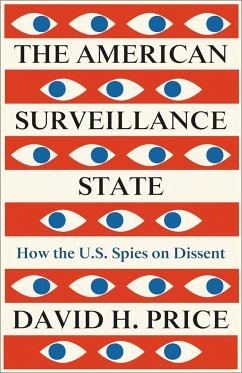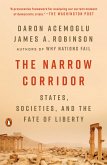David H. Price (Saint Martinâ s University)
The American Surveillance State
How the U.S. Spies on Dissent
18,99 €
inkl. MwSt.
Versandfertig in 2-4 Wochen

9 °P sammeln
David H. Price (Saint Martinâ s University)
The American Surveillance State
How the U.S. Spies on Dissent
- Broschiertes Buch
- Merkliste
- Auf die Merkliste
- Bewerten Bewerten
- Teilen
- Produkt teilen
- Produkterinnerung
- Produkterinnerung
The first complete history of the American surveillance state, from J. Edgar Hoover to Obama
Andere Kunden interessierten sich auch für
![Snowden's Box: Trust in the Age of Surveillance Snowden's Box: Trust in the Age of Surveillance]() Jessica BruderSnowden's Box: Trust in the Age of Surveillance15,99 €
Jessica BruderSnowden's Box: Trust in the Age of Surveillance15,99 €![The Club The Club]() Ellery LloydThe Club18,99 €
Ellery LloydThe Club18,99 €![The Narrow Corridor The Narrow Corridor]() Daron AcemogluThe Narrow Corridor14,99 €
Daron AcemogluThe Narrow Corridor14,99 €![The Fight for Privacy The Fight for Privacy]() Danielle Keats CitronThe Fight for Privacy13,99 €
Danielle Keats CitronThe Fight for Privacy13,99 €![Ill Fares The Land Ill Fares The Land]() Professor Tony JudtIll Fares The Land14,99 €
Professor Tony JudtIll Fares The Land14,99 €![The Secret History of the Five Eyes The Secret History of the Five Eyes]() Richard KerbajThe Secret History of the Five Eyes29,99 €
Richard KerbajThe Secret History of the Five Eyes29,99 €![Taking Intelligence Analysis to the Next Level Taking Intelligence Analysis to the Next Level]() Patrick McGlynnTaking Intelligence Analysis to the Next Level121,99 €
Patrick McGlynnTaking Intelligence Analysis to the Next Level121,99 €-
-
-
The first complete history of the American surveillance state, from J. Edgar Hoover to Obama
Hinweis: Dieser Artikel kann nur an eine deutsche Lieferadresse ausgeliefert werden.
Hinweis: Dieser Artikel kann nur an eine deutsche Lieferadresse ausgeliefert werden.
Produktdetails
- Produktdetails
- Verlag: Pluto Press
- Seitenzahl: 368
- Erscheinungstermin: 1. November 2022
- Englisch
- Abmessung: 216mm x 138mm x 26mm
- Gewicht: 386g
- ISBN-13: 9780745346014
- ISBN-10: 0745346014
- Artikelnr.: 64108135
- Herstellerkennzeichnung
- Produktsicherheitsverantwortliche/r
- Europaallee 1
- 36244 Bad Hersfeld
- gpsr@libri.de
- Verlag: Pluto Press
- Seitenzahl: 368
- Erscheinungstermin: 1. November 2022
- Englisch
- Abmessung: 216mm x 138mm x 26mm
- Gewicht: 386g
- ISBN-13: 9780745346014
- ISBN-10: 0745346014
- Artikelnr.: 64108135
- Herstellerkennzeichnung
- Produktsicherheitsverantwortliche/r
- Europaallee 1
- 36244 Bad Hersfeld
- gpsr@libri.de
David H. Price is Professor of Anthropology at Saint Martin's University's Department of Society and Social Justice. He is the author of a number of books on the FBI and CIA, and has written articles for The Nation, Monthly Review, CounterPunch, Guardian and Le Monde. His work has been translated into five languages.
Preface
Acknowledgments
Abbreviations and Codenames
Introduction
Part I: The Long View: Historical Perspectives of American Surveillance
1. J. Edgar Hoover and the FBI's Institutionalization of Surveillance
2. Memory's Half-life: Notes on a Social History of Wiretapping in America.
3. The New Surveillance Normal: Government and Corporate Surveillance in
the Age of Global Capitalism.
Part II: Lanting Those with a Communist Taint
4. The Dangers of Promoting Peace During Times of [Cold] War: Gene
Weltfish, the FBI, & the 1949 Waldorf Astoria's Cultural and Scientific
Conference for World Peace
5. Tribal Communism Under Fire: Archie Phinney and the FBI
6. The FBI's History of Undermining Legal Defenses: From Jury Panel
Investigations to Defense Lawyer Surveillance Programs
7. Agents of Apartheid: Ruth First and the FBI's Historical Role of
Enforcing Inequality
Part III: Monitoring Pioneers and Public Intellectuals
8. How the FBI Spied on Edward Said
9. Seymour Melman: the FBI's Persecution of the Demilitarization Movement
10. Traces of FBI Efforts to Deport a Radical Voice: On Alexander
Cockburn's FBI File
11. Medium Cool: Decades of FBI Surveillance of Haskell Wexler
12. Blind Whistling Phreaks and the FBI's Historical Reliance on Phone
Company Criminality
13. The FBI and Candy Man: Monitoring Fred Haley, A Voice of Reason During
Times of Madness
14. David W. Conde, Lost CIA Critic and Cold War Seer
Part IV: Policing Global Inequality
15. E. A. Hooton and the Biosocial Facts of American Capitalism
16. Walt Whitman Rostow and FBI Attacks on Liberal Anti-Communism
17. André Gunder Frank, the FBI, and the Bureaucratic Exile of a Critical
Mind.
18. Angel Palerm and the FBI: Monitoring a Voice of Independence at the
Organization of American States
19. The FBI's Pursuit of Saul Landau: Portrait of the Radical as a Young
Man
Conclusion
Acknowledgments
Abbreviations and Codenames
Introduction
Part I: The Long View: Historical Perspectives of American Surveillance
1. J. Edgar Hoover and the FBI's Institutionalization of Surveillance
2. Memory's Half-life: Notes on a Social History of Wiretapping in America.
3. The New Surveillance Normal: Government and Corporate Surveillance in
the Age of Global Capitalism.
Part II: Lanting Those with a Communist Taint
4. The Dangers of Promoting Peace During Times of [Cold] War: Gene
Weltfish, the FBI, & the 1949 Waldorf Astoria's Cultural and Scientific
Conference for World Peace
5. Tribal Communism Under Fire: Archie Phinney and the FBI
6. The FBI's History of Undermining Legal Defenses: From Jury Panel
Investigations to Defense Lawyer Surveillance Programs
7. Agents of Apartheid: Ruth First and the FBI's Historical Role of
Enforcing Inequality
Part III: Monitoring Pioneers and Public Intellectuals
8. How the FBI Spied on Edward Said
9. Seymour Melman: the FBI's Persecution of the Demilitarization Movement
10. Traces of FBI Efforts to Deport a Radical Voice: On Alexander
Cockburn's FBI File
11. Medium Cool: Decades of FBI Surveillance of Haskell Wexler
12. Blind Whistling Phreaks and the FBI's Historical Reliance on Phone
Company Criminality
13. The FBI and Candy Man: Monitoring Fred Haley, A Voice of Reason During
Times of Madness
14. David W. Conde, Lost CIA Critic and Cold War Seer
Part IV: Policing Global Inequality
15. E. A. Hooton and the Biosocial Facts of American Capitalism
16. Walt Whitman Rostow and FBI Attacks on Liberal Anti-Communism
17. André Gunder Frank, the FBI, and the Bureaucratic Exile of a Critical
Mind.
18. Angel Palerm and the FBI: Monitoring a Voice of Independence at the
Organization of American States
19. The FBI's Pursuit of Saul Landau: Portrait of the Radical as a Young
Man
Conclusion
Preface
Acknowledgments
Abbreviations and Codenames
Introduction
Part I: The Long View: Historical Perspectives of American Surveillance
1. J. Edgar Hoover and the FBI's Institutionalization of Surveillance
2. Memory's Half-life: Notes on a Social History of Wiretapping in America.
3. The New Surveillance Normal: Government and Corporate Surveillance in
the Age of Global Capitalism.
Part II: Lanting Those with a Communist Taint
4. The Dangers of Promoting Peace During Times of [Cold] War: Gene
Weltfish, the FBI, & the 1949 Waldorf Astoria's Cultural and Scientific
Conference for World Peace
5. Tribal Communism Under Fire: Archie Phinney and the FBI
6. The FBI's History of Undermining Legal Defenses: From Jury Panel
Investigations to Defense Lawyer Surveillance Programs
7. Agents of Apartheid: Ruth First and the FBI's Historical Role of
Enforcing Inequality
Part III: Monitoring Pioneers and Public Intellectuals
8. How the FBI Spied on Edward Said
9. Seymour Melman: the FBI's Persecution of the Demilitarization Movement
10. Traces of FBI Efforts to Deport a Radical Voice: On Alexander
Cockburn's FBI File
11. Medium Cool: Decades of FBI Surveillance of Haskell Wexler
12. Blind Whistling Phreaks and the FBI's Historical Reliance on Phone
Company Criminality
13. The FBI and Candy Man: Monitoring Fred Haley, A Voice of Reason During
Times of Madness
14. David W. Conde, Lost CIA Critic and Cold War Seer
Part IV: Policing Global Inequality
15. E. A. Hooton and the Biosocial Facts of American Capitalism
16. Walt Whitman Rostow and FBI Attacks on Liberal Anti-Communism
17. André Gunder Frank, the FBI, and the Bureaucratic Exile of a Critical
Mind.
18. Angel Palerm and the FBI: Monitoring a Voice of Independence at the
Organization of American States
19. The FBI's Pursuit of Saul Landau: Portrait of the Radical as a Young
Man
Conclusion
Acknowledgments
Abbreviations and Codenames
Introduction
Part I: The Long View: Historical Perspectives of American Surveillance
1. J. Edgar Hoover and the FBI's Institutionalization of Surveillance
2. Memory's Half-life: Notes on a Social History of Wiretapping in America.
3. The New Surveillance Normal: Government and Corporate Surveillance in
the Age of Global Capitalism.
Part II: Lanting Those with a Communist Taint
4. The Dangers of Promoting Peace During Times of [Cold] War: Gene
Weltfish, the FBI, & the 1949 Waldorf Astoria's Cultural and Scientific
Conference for World Peace
5. Tribal Communism Under Fire: Archie Phinney and the FBI
6. The FBI's History of Undermining Legal Defenses: From Jury Panel
Investigations to Defense Lawyer Surveillance Programs
7. Agents of Apartheid: Ruth First and the FBI's Historical Role of
Enforcing Inequality
Part III: Monitoring Pioneers and Public Intellectuals
8. How the FBI Spied on Edward Said
9. Seymour Melman: the FBI's Persecution of the Demilitarization Movement
10. Traces of FBI Efforts to Deport a Radical Voice: On Alexander
Cockburn's FBI File
11. Medium Cool: Decades of FBI Surveillance of Haskell Wexler
12. Blind Whistling Phreaks and the FBI's Historical Reliance on Phone
Company Criminality
13. The FBI and Candy Man: Monitoring Fred Haley, A Voice of Reason During
Times of Madness
14. David W. Conde, Lost CIA Critic and Cold War Seer
Part IV: Policing Global Inequality
15. E. A. Hooton and the Biosocial Facts of American Capitalism
16. Walt Whitman Rostow and FBI Attacks on Liberal Anti-Communism
17. André Gunder Frank, the FBI, and the Bureaucratic Exile of a Critical
Mind.
18. Angel Palerm and the FBI: Monitoring a Voice of Independence at the
Organization of American States
19. The FBI's Pursuit of Saul Landau: Portrait of the Radical as a Young
Man
Conclusion







